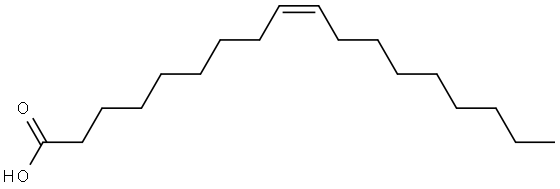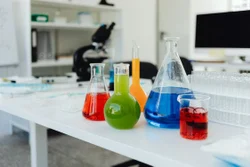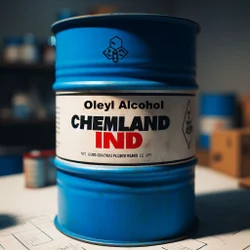Oleyl alcohol
Synonym(s):cis-9-Octadecen-1-ol;Z-9-Dodecen-1-ol;cis-9-Octadecen-1-ol;Oleyl alcohol
- CAS NO.:143-28-2
- Empirical Formula: C18H36O
- Molecular Weight: 268.48
- MDL number: MFCD00002993
- EINECS: 205-597-3
- SAFETY DATA SHEET (SDS)
- Update Date: 2025-12-17 09:49:23

What is Oleyl alcohol?
Chemical properties
Colourless or light yellow liquid.
Chemical properties
Oleyl alcohol occurs as a pale yellow oily liquid that gives off acrid fumes when heated.
Chemical properties
Colorless to light yellow liquid; fatty aroma with animal undertones.
The Uses of Oleyl alcohol
oleyl alcohol is an emollient, solvent, viscosity-increasing agent, and carrier employed in a wide variety of cosmetic formulations including makeup, skin care, and hand and body preparations. oleyl alcohol is an unsaturated fatty alcohol found in fish oils and can also be produced synthetically. According to some sources, it is comedogenic and has a mild irritancy potential.
The Uses of Oleyl alcohol
Chiefly in the manufacture of its sulfuric esters which are detergents and wetting agents, as an antifoam agent; metal cutting lubricant; in carbon paper, stencil paper, printing ink; as a plasticizer; for softening and lubricating textile fabrics; carrier for medicaments.
The Uses of Oleyl alcohol
Oleyl alcohol is used in softening and lubrication of textile fabrics, and in the production of carbon paper, stencil paper, and printing ink. It finds application in cosmetic products viz skin creams and lotions as a thickner, hair conditioners and hair coating shampoos. It is utilized as an antifoaming agent and cutting lubricant, as the precursor for the preparation of its sulfuric ester derivatives, which are used in detergents and wetting agents. It plays a vital role in various formulations for drug delivery.
What are the applications of Application
Oleyl alcohol is a long-chain, unsaturated fatty alcohol that can be used as an emulsifier, nonionic surfactant and thickener
Definition
ChEBI: A long chain fatty alcohol that is octadecanol containing a double bond located at position 9 (the Z-geoisomer).
Production Methods
Oleyl alcohol occurs naturally in fish oils. Synthetically, it can be prepared from butyl oleate by a Bouveault–Blanc reduction with sodium and butyl alcohol. An alternative method of manufacture is by the hydrogenation of triolein in the presence of zinc chromite.
brand name
Witcohol 85 (Witco); Witcohol 90 (Witco).
Aroma threshold values
Fatty-type, medium strength odor.
General Description
Oleyl alcohol has been reported as an effective solvent for oil/water-type tacrolimus (FK506) cream formulation, useful for atopic dermatitis treatment. It was reported as diluting agent for Alamine 336. Palm oil esters derived from oleyl alcohol, have potential applications in the cosmetic and pharmaceutical industries due to the excellent wetting behavior of the esters without the oily feel.
Flammability and Explosibility
Non flammable
Pharmaceutical Applications
Oleyl alcohol is mainly used in topical pharmaceutical formulations
and has been used in transdermal delivery formulations.It has
been utilized in the development of biodegradable injectable
thermoplastic oligomers,and in aerosol formulations of insulin
and albuterol.
Therapeutically, it has been suggested that oleyl alcohol may
exhibit antitumor properties via transmembrane permeation.
Safety Profile
A human skin and eye irritant. Aningredient in cosmetics. When heated to decomposition itemits acrid smoke and irritating fumes.
Safety
Oleyl alcohol is mainly used in topical pharmaceutical formulations
and is generally regarded as a nontoxic and nonirritant material at
the levels employed as an excipient. However, contact dermatitis
due to oleyl alcohol has been reported.
The results of acute oral toxicity and percutaneous studies in
animals with products containing 8% oleyl alcohol indicate a very
low toxicity. Formulations containing 8% or 20% oleyl alcohol
administered by gastric intubation, at doses up to 10 g/kg bodyweight,
caused no deaths and no toxic effects in rats.
Storage
The bulk material should be stored in a well-closed container in a cool, dry, place.
Purification Methods
Purify it by fractional crystallisation at -40o from acetone, then distil it under vacuum. [Beilstein 2 IV 2204.]
Regulatory Status
Included in the FDA Inactive Ingredients Database (topical emulsions and ointments). Included in nonparenteral medicines licensed in the UK. Included in the Canadian List of Acceptable Non-medicinal Ingredients.
Properties of Oleyl alcohol
| Melting point: | 0-5.0 °C (lit.) |
| Boiling point: | 207 °C/13 mmHg (lit.) |
| Density | 0.849 g/mL at 25 °C (lit.) |
| vapor pressure | 10.64 hPa (195 °C) |
| FEMA | 4363 | CIS-9-OCTADECENOL |
| refractive index | n |
| Flash point: | >230 °F |
| storage temp. | -20°C |
| solubility | Soluble in ethanol (95%), and ether; practically
insoluble in water. |
| form | Viscous Liquid |
| pka | 15.20±0.10(Predicted) |
| color | Clear almost colorless to yellow |
| Odor | fatty animal |
| Water Solubility | Miscible with alcohol and ether. Slightly miscible with carbon tetrachloride. Immiscible with water. |
| JECFA Number | 1637 |
| Merck | 14,6831 |
| BRN | 1723962 |
| Stability: | Stable. Combustible. Incompatible with strong acids, strong oxidizing agents. |
| CAS DataBase Reference | 143-28-2(CAS DataBase Reference) |
| NIST Chemistry Reference | Oleyl Alcohol(143-28-2) |
| EPA Substance Registry System | 9-Octadecen-1-ol, (9Z)- (143-28-2) |
Safety information for Oleyl alcohol
| Signal word | Warning |
| Pictogram(s) |
 Exclamation Mark Irritant GHS07 |
| GHS Hazard Statements |
H315:Skin corrosion/irritation H320:Serious eye damage/eye irritation |
| Precautionary Statement Codes |
P264:Wash hands thoroughly after handling. P264:Wash skin thouroughly after handling. P280:Wear protective gloves/protective clothing/eye protection/face protection. P321:Specific treatment (see … on this label). P332+P313:IF SKIN irritation occurs: Get medical advice/attention. |
Computed Descriptors for Oleyl alcohol
Oleyl alcohol manufacturer
New Products
4,4-Difluoropiperidine hydrochloride tert-butyl 9-methoxy-3-azaspiro[5.5]undecane-3-carboxylate Indole Methyl Resin N-Isopropylurea N,N-Dicyclohexylcarbodiimide(DCC) MELDRUMS ACID 5-METHYLISOXAZOLE-4-CARBOXYLIC ACID Magnessium Bis glycinate Zinc ascorbate 1-bromo-2-butyne 2-acetamidophenol 9(10H)-anthracenone Erythrosin B, 4-Piperidinopiperidine 2-((4-morpholinophenylamino) (methylthio) methylene) malononitrile 2,4-dihydroxybenzaldehyde 3-(4-morpholinophenylamino)-5-amino-1H-pyrazole-4-carbonitrile Methyl 2-methylquinoline-6-carboxylate 2,6-dichloro-4-nitropyridine 4-Bromo-2-chlorobenzonitrile 2-(benzylamino)acetic acid hydrochloride 4-(tert-Butoxycarbonylamino)but- 2-ynoic acid 3,4-dihydro-2H-benzo[b][1,4]dioxepine 1-Phenyl-1-cycloprppanecarboxylicacidRelated products of tetrahydrofuran








You may like
-
 Oleyl alcohol CAS 143-28-2View Details
Oleyl alcohol CAS 143-28-2View Details
143-28-2 -
 Oleyl alcohol CAS 143-28-2View Details
Oleyl alcohol CAS 143-28-2View Details
143-28-2 -
 Oleyl Alcohol (High Purity) CAS 143-28-2View Details
Oleyl Alcohol (High Purity) CAS 143-28-2View Details
143-28-2 -
 Oleyl alcohol, pract CAS 143-28-2View Details
Oleyl alcohol, pract CAS 143-28-2View Details
143-28-2 -
 Oleyl Alcohol CAS 143-28-2View Details
Oleyl Alcohol CAS 143-28-2View Details
143-28-2 -
 Oleyl alcohol CAS 143-28-2View Details
Oleyl alcohol CAS 143-28-2View Details
143-28-2 -
 Oleyl alcohol CAS: 143-28-2View Details
Oleyl alcohol CAS: 143-28-2View Details
143-28-2 -
 Oleyl Alcohol 99, Greater than 99%, 50 kg DrumView Details
Oleyl Alcohol 99, Greater than 99%, 50 kg DrumView Details
143-28-2
